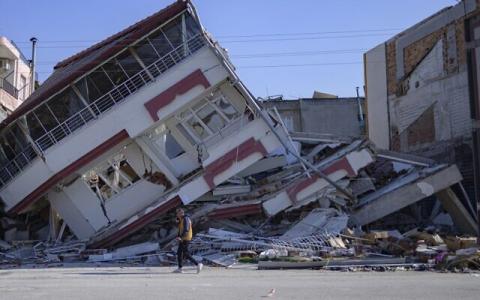
The UK has slashed its funding of the Syrian refugee programme by a third at a major United Nations donor conference, despite direct appeals from the UN that the plight of refugees has grown worse than ever during Syria’s 10-year civil war.
The UK offer of at least £205m was made by the foreign secretary, Dominic Raab, and compares with a donation of £300m at the same conference last year. The UK eventually provided £400m last year, so if there is no additional UK funding later in the year, the British aid cut will be almost 50%.
It is the latest in a long line of cuts being made by the UK to its aid programme due to its decision to reduce the size of the British aid budget relative to the size of the country’s economy.
Raab stressed that the UK had provided £3.5bn to help Syrian refugees inside Syria and in neighbouring countries since 2012. But he also accepted Syria’s neighbours were under exceptional pressure due to Covid.
Germany, the US and the EU, traditionally the largest donors to the Syria refugee programme, did not cut their donations, and Berlin pledged not only £480m for this year but the same sum for next year. The US pledge includes future loans.
Shortly before Raab spoke, the UN secretary general, António Guterres, told the video conference: “For 10 years, Syrians have endured death, destruction, displacement and deprivation.
“And things are getting worse, not better. More than 13 million people need humanitarian assistance to survive this year. That’s over 20% more than last year, and the majority of the population is now facing hunger.”
The head of the UN’s humanitarian operations, Mark Lowcock, had also made a direct appeal to the UK not to cut its aid to Syria, warning that such cuts in help to refugees could come back to bite the UK in the future. Lowcock told the conference plummeting living conditions, economic decline and Covid-19 were resulting in more hunger, malnutrition and disease.
“There is less fighting, but no peace dividend. More people need more help than at any point during the war.”
Jean-Michel Grand, executive director of charity Action against Hunger, called the British cut unacceptable. “This is a region blighted by war, ravaged by Covid-19, and with an economy in freefall. In 10 years of conflict, the situation has never been worse,” he said.
“Back in November, the government told MPs it would continue to stand shoulder to shoulder with the Syrian people in their time of need. Cutting our aid commitment by almost a third represents no such solidarity or support.
“The world is watching to see what global Britain truly means and so far the portents aren’t good. We slashed aid to Yemen, a country teetering on the brink of famine, and have followed suit by reducing support to Syria by 32%.”
The aid agency is one of the few operating inside Syria. Unicef UK said: “Now is not the time to reel in a lifeline to some of the world’s most vulnerable children.”
The UN at its fifth pledging conference had been seeking $10bn (£7.3bn) for the overall aid programme for Syria in 2021 with money going to Syria, Lebanon, Turkey and Jordan.
UN officials told the conference that $4.2bn would be earmarked for people inside Syria and $5.8bn for refugees and their hosts in the Middle East.
About 24 million people need basic aid, a rise of 4 million over the past year and the highest number yet.
Many of the speakers highlighted that a whole generation born in Syria had never known anything but war, and many of them had received little or no formal education. But there is little or no sign that the country’s president, Bashir al-Assad, is prepared to negotiate with his political opponents, and regardless of the economy, it feels entrenched in power by Russia.
Heiko Maas, the German foreign minister, told the conference: “A decade has passed since a group of 50 children painted a slogan of the Arab spring on the wall of the town of Deraa. Assad’s secret police arrested and tortured them. Since then a decade of destruction has been wrought upon the people of Syria by its regime and its international supporters crushing their hopes for change.”
He said half the Syrian population was in need of aid, 90% live in poverty and 2.4 million children cannot go to school.
With Syria due to hold its own presidential elections later this year, and refusing to engage in the UN peace process, Maas said: “Sham elections in a ruined country cannot replace a real political process.”
Many of the speakers warned of the threat facing 3 million Syrians in the north-west of the country if Russia goes ahead with plans at the UN in July to close the final cross-border point of passage for aid.
But with the west unable to find any leverage over Russia to bring Assad to the UN negotiating table, the danger is that Syria will go through another year of torment.











